|
PREMIERES
MIDNIGHT MOVIES - Two cult classics by Gaspard Noé
Particularly gruesome this year, the midnight movies will get your blood pumping!
After the films,a free breakfast is provided by Coffee Works... If you have any appetite left!
CLASSICS
SHORT FILMS
|
Complete Schedule
Print the 2006 schedule (pdf)
Please note: the feature films are scheduled to start approximatively 10 to 15 minutes after indicated showtimes to allow for pre-screening drawing and short film. Please allow more time for opening and closing screenings introductions.
|
Les Brigades du Tigre (The Tiger Brigades)
Jérôme Cornuau - 2006 - NORTH AMERICA PREMIERE
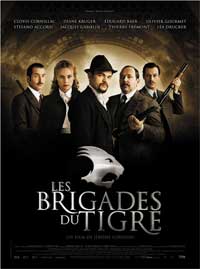 OPENING NIGHT- Friday July 14 - 8:30pm OPENING NIGHT- Friday July 14 - 8:30pm
Q&A with Dr Kevin Elstob, professor of French at CSU Sacramento, follows.
The French Untouchables!
1907: An unprecedented crime wave steeps the "Belle Epoque" in blood. Confronted by these bandits of the new century, the Minister of the Interior, Georges Clémenceau (nicknamed The Tiger), creates a mobile police force to match them: the Flying Squad (brigades volantes) whose jurisdiction consists of the whole French territory. Soon, all of France knows these brigades by another name: The Tiger's Brigades.
1974:Les Brigades du Tigre reappear in a very popular French television series which was a huge success in the 70's and early 80's, and is now, along with its unforgettable music score, part of France's cultural patrimony.
2006: Les Brigades du Tigre are back with a highly entertaining, moving and unpredictable action movie mixing historical figures - Jean Jaures (André Marcon), Jules Bonnot (Jacques Gamblin) - and events - the
the "triple entente" alliance between France, Russia and England; the "Russian Loans"; the premises of the socialist revolution in Russia,. - with fictional events and characters. While taking some carefree liberties with historical facts, the film is very accurate in its depiction of 1910's France. Les Brigades du Tigre is a modern adaptation of the television series but remains faithful to its spirit and keeps its cherished musical theme.
Lead by one of France's darling actors, Clovis Cornillac (saw in Nickel & Dime last year at the SFFF) as the Commissaire Valentin, the team of the Brigade includes the dandy inspector Pujol (Edouard Baer) and the brawny inspector Terrasson (Olivier Gourmet). Equipped with the most modern technology (such as telegraph, motorbikes and cars, typewriters, photography, a laboratory of chemical analysis, and the use of fingerprints) they will try to discover the connections between anarchist gangsters (the notorious "Bande a Bonnot", responsible for the first ambush attack of a bank wagon with a car in Paris on rue Ordener December 21, 1911 as depicted in the film), corrupted civil servants, Russian insurrectionists and the beautiful and idealistic wife of a Russian prince (Diane Kruger); while at the same time fighting against the Parisian police.
The film is reminiscent of the silent serials by Louis Feuillade (Les Vampires) with its multiple colorful and surprising episodes and facets (action, suspense, love story, humor, etc.). The Sacramento French Film Festival brings you for the first time in North America Les Brigades du Tigre, the French Untouchables, a clever and fun period movie created to entertain.
Shown with Le Carton (Fair game) by Didier Guyard - WORLD PREMIERE
"Real good popular cinema. A roaring film!" - Studio Magazine
"Action, emotion, explosions: These tigers' perfume is dynamite!" - Le Journal du Dimanche |
La Moustache (The Mustache)
Emmanuel Carrère - 2005
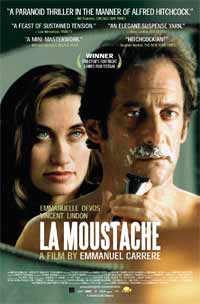
Saturday July 15 - 6:30pm & Sunday July 16 - 1pm
Marc (Vincent Lindon) and Agnès (Emmanuelle Devos) form an attractive, successful and loving Parisian couple. One day, on a whim, Mark decides to shave off the mustache he's worn all of his adult life. He waits patiently for his wife's reaction, but neither she nor his friends seem to notice. Stranger still when he finally tells them, they all insist that he never had a mustache. Has Marc gone mad or has the world around him? Is he the victim, of some elaborate conspiracy?
An innocent beginning to a puzzling drama portraying a couple who grow apart by focusing on a man struggling with the loss of his personal identity and unable to distinguish between reality and imagination. The whole story is seen by Marc and we only have access to what the other characters say or do through his eyes. For
Carrère "it is also the story of a man given the opportunity to find himself, and in the process, a couple that overcomes a huge but ordinary ordeal. (.) I think that this mustache business is something that all couples come up against, at one time or another, in one shape or another. And if they don't come up against it, then it's much worse." La Moustache is a reflection on marriage and on the notion that two people, no matter how intimately connected, inhabit separate worlds.
Adapting his own novel Emmanuel Carrère has crafted a surreal and engrossing existential thriller, inviting all interpretations. The film is punctuated by the intoxicating Violin Concerto by Philip Glass.
Shown with The First Try by Raphaël Hitzke
"A paranoid thriller in the manner of Alfred Hitchcock." - Bill Stamets - Chicago Sun-Times
"A mini masterwork." - Michael Atkinson - The Village Voice
|
�
Vers le sud (Heading South)
Laurent Cantet - 2005
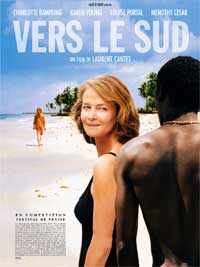
CLOSING NIGHT - Sunday July 23 - 7:40pm
Q&A
with Liz Constable, Associate Professor French and Italian Dept. UC Davis, follows.
With the critically acclaimed films Human Resources and Time Out , Laurent Cantet has established himself as one of French cinema's leading screen realists and analysts of social discontent. For his third feature he leaves the French territory for a devastating investigation of sexual tourism. The setting is a beach resort in late 70's Haiti, where middle-aged North American women go to be sexually pampered by young black men, rewarding them with economic and quasi-maternal favors. "Welcome to Paradise", says the resort's "queen bee" Ellen (Charlotte Rampling) to newcomer Brenda (Karen Young), but outside the hotel's artificial bubble, the Duvalier regime is in power. It can't be long before Legba (Menothy César, winner of the Marcello Mastroianni Award at the 2005 Venice Film Festival ), the teenage gigolo favored by both Ellen and Brenda, falls foul of the all-powerful Macoute militia.
The script, based on three short stories by Haitian writer Dany Laferrière, explores a complex network of sexual and political issues. Cantet makes us feel the women's loneliness and their poignant needs for love, sex and affection, while at the same time showing us how they selfishly choose to turn a blind eye on the dire political and economical situation that drives vulnerable young men into their beds. The film is viewed from the women's perspective. Their choice to ignore the political reality of Haiti is also a choice to ignore Legba's real life and feelings. When crisis arises, they will be left with their egotistic dream shattered and a lot of questions unanswered. Heading South received the Cinema for Peace Award at Venice
Shown with La Révolution des crabes (The Crab Revolution) by Arthur de Pins
"The image of that ageless free spirit Charlotte Rampling cuddling an 18-year-old Haitian youth on a Caribbean beach in the film ''Heading South'' is charged with so many erotic, political and cultural connotations, they are almost too much for one movie to handle." Stephen Holden - The New York Times
"Among the cast of this gripping, compact drama, Karen Young is terrific as the vulnerable Brenda, while as the ambivalent, possessive, highly knowing Ellen, Charlotte Rampling rides her current career renaissance with cool, abrasive brilliance." - Jonathan Romney - 2005 London Film Festival. |
�
Gabrielle
Patrice Chereau -2005
| 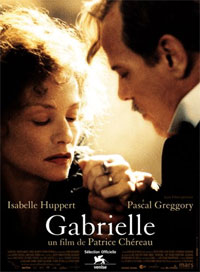 One screening only Saturday July 15 - 8:45pm One screening only Saturday July 15 - 8:45pm
In this faithful adaptation of Joseph Conrad's short story The Return, filmmaker and theatre director Patrice Chéreau recreates turn-of-the-century France with superb attention to detail, and relates the events that overwhelm a middle-aged, seemingly happily married couple superbly played by Isabelle Huppert and Pascal Greggory.
The opening scene mirrors the first paragraphs of Conrad's story, as the arrogant, bourgeois M. Hervey descends from a train. While on his way home, he reflects on the sturdiness of his life: the success he has made of it, the fortress of security he has built around himself and the strength of his marriage. M. Hervey sees his wife, Gabrielle as a trophy-wife and admires her social skills but has never really considered her as a woman. It is not long before his self-satisfaction and confidence are rudely shattered when he discovers a letter from Gabrielle waiting for him in his room. The contents of the message and the events that ensue will crumble his security, plunge him into newfound feelings of vulnerability and force him to reexamine his life.
Chéreau's films have always been marked by their dark, unrelenting penetration of the human psyche. Gabrielle achieves a deep emotive power, which is in no small part due to the exceptional performances by the two lead actors. The mature focus on the unhappy married couple is the film's greatest power, in a way that recalls Ingmar Bergman's films on the same subject.
Gabrielle was nominated for six Césars in 2006 and won for Best Costume Design and Best Art Direction
Shown with A l'Ombre du voile (Shadow of Veil) by Arnaud Demuynk
"Gabrielle is an intense and interior film with moments of sublime visual power. The combination of atmospheric settings, ardent performances and painterly camerawork makes Gabrielle a magical and absorbing piece of cinema." - Piers Handling - Toronto International Film Festival |
�
Les Temps qui changent (Changing Times)
Andre Techine - 2003
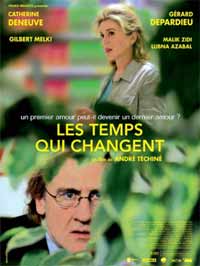 Saturday July 15 - 1:55pm & Sunday July 16 - 5:25pm Saturday July 15 - 1:55pm & Sunday July 16 - 5:25pm
Antoine (Gérard Depardieu), a successful engineer, arrives in Morocco from Europe to supervise the construction of an audiovisual center in the tax free zone of Tangiers. But the secret goal of his trip is to track down Cécile (Catherine Deneuve) his first love with whom he is still obsessed even though she left him more than thirty years ago. He has never married and comes to offer Cécile the gift of a love that time has only strengthened. But Cécile has forgotten Antoine. Twenty years ago she immigrated to North Africa to marry Nathan a Jewish doctor younger than her with whom she has a son, Sami (Malik Zidi). That same summer, Sami who lives in Paris, comes to visit his parents unexpectedly accompanied by his emotionally disturbed girlfriend Nadia (Lubna Azabal). Nadia is here to reunite with her twin sister who refuses to see her. Sami also has a secret mission: rekindle this passion with Bilal (Nadem Rachati) and try to convince him to come back to Paris.
French legendary stars Deneuve and Depardieu, together for the first time since Le Dernier Metro in 1980, and instantly credible as a couple with a passionate past, lead a wonderful ensemble cast. Téchiné takes us on his familiar grounds: including sex vs. love, cross-generational relations, homosexuality and the gap between well-to-do Europe and developing nations. He pulls together a multi-layered drama, at times very funny, that sharply contrasts the idealistic and realistic aspects of love to create a thoughtful and reflective love story about the impact of time on true love. Each character struggles with the past and loss of a romantic ideal. Only Antoine remains "pure" but at what cost? Which is worse: the loss of an ideal or the loss of one's life by clinging to that ideal?
Shown with Le Baiser by Stéfan Le Lay
"Production design, story and the actors conspire to present us with a provocative meditation on what changing times can do to relationships, cultures, cities and love itself." - Kirk Honeycutt - The Hollywood Reporter
“Visually alive, quick-witted and full of heart; it thrills you with its energy!” - Stephen Holden - The New York Times
|
�
Le Petit Lieutenant (The Young Lieutenant)
Xavier Beauvois - 2005
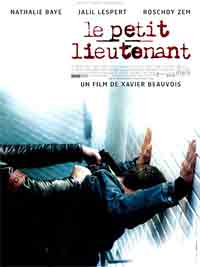 Saturday July 22 - 8:30pm & Sunday July 23 - 12:50pm Saturday July 22 - 8:30pm & Sunday July 23 - 12:50pm
After his graduation from the police academy, Antoine (Jalil Lespert) is delighted when his request for assignment in Paris is granted. While his wife remains in Normandy, Antoine finds a place in town and starts work in the criminal unit run by Inspector Caroline Vaudieu (Nathalie Baye) who immediately takes him under her wing. When tragedy happens Vaudieu has to fight the memories that she used to drown in alcohol. Revenge is small comfort.
Le Petit Lieutenant is not a standard film noir. Beauvois's subtle and impressionistic mise-en-scene explores the personalities inside the police station more than the crime itself. As shown in his acclaimed earlier films (Nord, N'oublie pas que tu vas mourir - Cannes Jury Prize) Beauvois is exceptionally skilled at orchestrating ensemble casts; the interplay between Lespert, Baye and their fellow cops Roschdy Zem, Antoine Chappey and Xavier Beauvois himself feels both precise and remarkably natural. The police unit becomes a refuge for each of these characters, a place for them to let down their guard and be themselves - until tragedy strikes and reconfigures all their relationships.
Director Xavier Beauvois about his film: "I met a police captain working with the Criminal Investigation Division and spent several months following him out in the field and in the office, even passing myself off as a police lieutenant at times. I had an idea for a story about a young lieutenant confronted with the harsh reality of his chosen profession on his first posting. I built on a true story, with the desire to be scrupulously faithful to the reality of a police investigation and to use all I had seen."
A great success in France, acclaimed by Les Cahiers du Cinema as one of the 10 Best films of 2005, Le Petit Lieutenant was nominated for 6 Cesars in 2006, for Best Film; Best Director; Best Supporting Actor (Roschdy Zem) and Best Original Screenplay categories. Nathalie Baye won the César for Best Actress for her role in the film.
Shown with Nocturne by Guillaume Delaunay
"Le Petit Lieutenant really deserves a promotion!" - Alain Spira - Paris Match
"Two hours at the police station that you won't regret!" - Grégory Alexandre
- Rolling Stone
|
Travaux (on sait quand
ça commence...) (Housewarming)
Brigitte Roüan - 2005
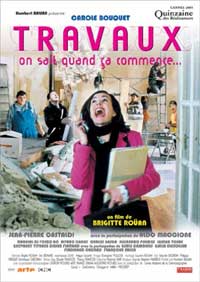 Saturday July 22 - 6:15pm & Sunday July 23 - 3:15pm Saturday July 22 - 6:15pm & Sunday July 23 - 3:15pm
Chantal Letellier (gorgeous Carole Bouquet) is a single mother of two and a lawyer who literally dances her magical way to fight for the rights of illegal immigrants. She puts her money where her liberal mouth is when she agrees to hire one of her clients, a Colombian architect who, boundlessly grateful and taking the opportunity to start a portfolio, redesigns her entire living space. Recruiting a crew of workers with good intentions but no paperwork, he quickly turns her apartment into a money pit of a construction zone with no visible end in sight. As the French title and one of the characters say: "Home remodeling, one knows when it starts, but one never knows when it might be finished."
The whole way through, Chantal manages to hold onto her sanity while wondering if more than her home is getting remodeled.
Travaux is a hilarious, delightful and socially-conscious comedy. Despite the issues of illegal workers and immigration, Roüan keeps the tone very light, switching from physical to visual comedy and from puns to gags. Don't miss the surprise cameo of Chantal's new neighbor at the very end. Anyone who has ever had workmen over to remodel their home will instantly identify with Housewarming, this madcap, mile-a-minute comedy with its good social intentions and high-spirited direction by César-winning Brigitte Roüan.
Shown with Sens Unique (One-Way Street) by Gidla Taffet
"Actress-turned-director Roüan ( Post Coitum ) adroitly keeps the frenetic pace aloft while working in some serious-minded social commentary without skipping a beat." - Michael Rechtshaffen - Hollywood Reporter
"Roüan directs the fast footed and outrageous ensemble cast like a lion tamer, keeping the level of chaos high" - Variety
|

Seul contre tous (I Stand Alone)
Gaspard Noe - 1998
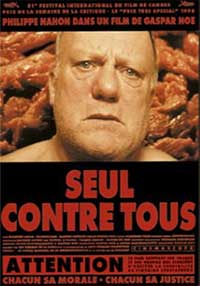 One screening only - Saturday July 15 - midnight - Followed by an early breakfast! One screening only - Saturday July 15 - midnight - Followed by an early breakfast!
One of the darkest films ever made, Seul Contre Tous marked the shocking debut of young Argentinian-born filmmaker Gaspard Noé.
Seul contre tous, "the tragedy of a jobless butcher struggling to survive in the bowels of his nation," is the story of an unemployed 50-year-old Parisian butcher (Philippe Nahom) whose bitterness accumulates into a sustained psychotic rage. The film starts by a slide-show biography (synopsis of Noé's 1992 short film, Carne) , in which we see a World War II orphan becoming a dealer in horse meat, then winding up in prison for stabbing some guy who he imagined had raped his autistic daughter. Seul contre Tous starts then.
Through a surprising mastery of the cinematographic tool, Gaspard Noé managed to create a black and disturbing world, the world inside the head of his nihilist, deranged and embittered antihero. Most of the harsh language isn't spoken out-loud but is the unedited voice-over stream of consciousness in the boiling head of a man who sees the entire world as his enemy. The film uses the most extreme images and jarring sound effects to brand his character's message into our brains whether we like it or not. Right before the bloody ending, Noé gives the audience
a 30-second warning to either leave the theater or avert their eyes... You have been warned! All sales final, no refunds!
"Fleshy, hollowed-eyed and glowering impassively, Mr Nahon's butcher suggests a walking piece of meat wired with dynamite. The movie's triumph -if that's what it is- is in the force of its assault. It takes one man's unbearable truth and bashes us in the skull with it. The hurt lingers." - Stephen Holden - The New York Times |
Irréversible (Irreversible)
Gaspard Noé - 2002
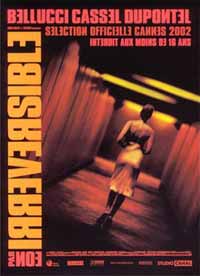 One screening only - Saturday July 22 - midnight - Followed by an early breakfast! One screening only - Saturday July 22 - midnight - Followed by an early breakfast!
Following his dark and nihilist first film, Seul contre tous, Gaspard Noé came back with a darker, and more unsettling and controversial film. Irréversible combines prolonged scenes of extremely brutal violence and explicit sex (including one of the most gruesomely detailed rapes ever seen on screen) with a fearless and original filmmaking style.
The film begins in extreme violence as we follow Marcus (Vincent Cassel) and his friend Pierre (Albert Dupontel) frantically stalking through a gay club looking for a man to beat. Composed of a dozen extended sequences, the film starts at the story's chronological end and quickly we learn that the two brutal men were searching for the man who raped Alex (Monica Bellucci), Marcus' girlfriend. With the talented Noé behind the camera this story of revenge is anything but conventional. The backward construction of the film produces a strange experience as characters who initially appear utterly loathsome gradually evolve into likeable individuals. Irréversible demonstrates that our view of the world is fundamentally influenced by what we know of it and that the more we know the more we can understand and perhaps ultimately forgive. The film premise is that "time destroys everything" and indeed the film ends as the story began, with tender intimacy between the two unfortunate and oblivious lovers. Irréversible offers much to ponder about the nature of fate, the futility of revenge and the fragility of life.
The film stars three favorite actors in France : real-life couple Monica Bellucci and Vincent Cassel (also starring in La Haine shown on the second weekend of the 2006 SFFF) as well as Albert Dupontel mostly known for his dark comic roles. It takes the talent of Gaspard Noé to lead these A-class actors into such a risky and provocative project. The electronic score is by Thomas Bangalter, better known as one-half of the popular Euro dance-pop band, Daft Punk.
"It is a work specifically designed to disturb and disgust, and it accomplishes both goals so completely some people will find it impossible to watch at all." - Rene Rodriguez - The Miami Herald
"I hope people who go to see this don't walk out in the first ten minutes or after that [rape] scene, because I think you have to experience the entire film. And then you can decide whether or not you're offended by it." - Richard Roeper - Ebert & Roeper
" Irreversible may be the first feature shot in crystal meth vision (.) Mr Noé is out to provoke, which he is capable of because there is ambition and drive in his filmmaking." - Elvis Mitchell - the New York Times
|
Le Vieil Homme et l'enfant (The Two of Us)
Claude Berri - 1967
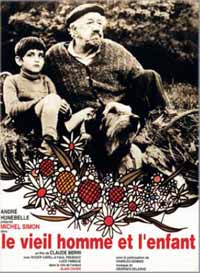 Saturday July 15 - 11:40am & Sunday July 16 - 3:10pm Saturday July 15 - 11:40am & Sunday July 16 - 3:10pm
"I was 8 years old and already a Jew." In occupied France , 1944, the Langmann family realizes their "Alsatians" disguise is wearing thin and decide to send their mischievous son (Alain Cohen) off to the farm of a friend's elderly parents, after giving him a quick lesson in Catholicism and a new French surname. There, Claude develops an unlikely friendship with the lovable but grumpy and anti-Semitic Pépé (Michel Simon) who constantly grumbles against "the enemies of France" - the English, the Masons, the Bolsheviks, and especially the Jews - but gets teary-eyed at the mere mention of Marshal Pétain and spoon feeds his old dog.
Claude Berri (né Langmann)'s feature debut is a tender recollection of his wartime childhood (the film was shot in location near Grenoble). 72-year-old Michel Simon won the Berlin Film Festival's Best Actor award for his performance which capped a 50-year career that included towering performances in classic films by Renoir, Clair, Duvivier, Carné, and Vigo (L'Atalante), to name but a few. Young Alain Cohen is playing with extraordinary boldness against that enormous old genius. The film features beautiful black-and-white photography by Jean Penzer and a beautiful score by Georges Delerue. Co-written (with Berri) by Gerard Brach, who had just collaborated with another Survivor, Roman Polanski, on "Repulsion" and "Cul-de-sac".
Shown with Le Poulet (1962), Berri's Oscar-winning short.
"For twenty years I have been waiting for a film about the real France during the Occupation...Now The Two of Us makes the long wait worth it...[It's] one of those emotional stories that are truer and stronger than any love story." - François Truffaut. |
Les Vacances de Monsieur Hulot (Mr Hulot's Holiday)
Jacques Tati - 1953
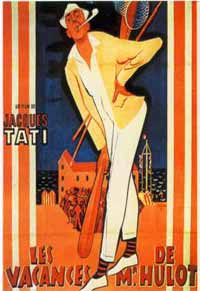 Saturday July 15 - 4:15pm & Sunday July 16 - 10:45am Saturday July 15 - 4:15pm & Sunday July 16 - 10:45am
Q&A with J. Greenberg follows.
Bring your kids to this fun family-friendly film with few dialogues and subtitles!
Monsieur Hulot goes on holiday to a seaside resort. The peace and quiet of the hotel guests don't last very long with Hulot around, because although his intentions are good, things always seem to turn out catastrophically. Oblivious of the chaos he creates around him, Mr Hulot makes the most of his holiday, while everyone else's vacations turn into a nightmare.
Tati won international acclaim with his second film, the first entry in the Hulot series in which he shows not only his comic mastermind but also his talent for observation. This satire of middle class vacationers determined to enjoy themselves includes a series of hilarious precisely choreographed visual gags involving dogs, boats, firecrackers and a famous tennis lesson. It is a masterpiece of slapstick comedy and contains so many details and facets that it takes several viewings to take it all in and truly appreciate Tati's genius. As most of Tati's films, under a highly comic surface, Les Vacances de Monsieur Hulot also reveals a melancholic dimension with loneliness as a recurring theme.
Shown with Bouts en train by Émilie Sengelin
"There are some real laughs in it, but Mr. Hulot's Holiday gives us something rarer, an amused affection for human nature -- so odd, so valuable, so particular." - Roger Ebert - Chicago Sun-Times
|
Weekend
Jean-Luc Godard - 1967
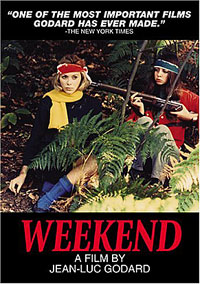 Saturday July 22 - 3:45pm & Sunday July 23 - 10:30am Saturday July 22 - 3:45pm & Sunday July 23 - 10:30am
A nasty bourgeois Parisian couple (Mireille Darc and Jean Yanne) embarks on a journey through the countryside to her father's house, where they pray for his death and a subsequent inheritance. Their trip is at first delayed, and later distracted by several outrageous events and characters including an apocalyptic traffic jam, a group of fictional philosophers, a couple of violent carjackers, and eventually, a gross display of cannibalism.
In 1967, Jean-Luc Godard gleefully announced the end of his career with this darkly funny vision of hell; a fascinating companion piece to Bunuel's Discreet Charm of The Bourgeoisie (the structure is nearly identical), Weekend is a portrait of France (and Western consumer culture) in full crash-and-burn decline. The horrifying long-take tracking sequence of the traffic jam on the road to Oinville has become as famous as Eisenstein's "Odessa Steps", and the film as a whole has attained the status of a major postmodern event. Brutally (and beautifully) photographed in color by Raoul Coutard, and featuring (in a small role) Jean-Pierre Leaud, a sadistic hat-tip to Godard's rival, Francois Truffaut.
With Weekend , Jean-Luc Godard reaches an impressive level of originality, incorporating inter-titles, extended tracking shots, and music to add an entirely new grammar to film language. The result is a deeply challenging work that will invigorate viewers. Shot in 1967, Weekend has been viewed as a premonition of the events of May 1968. It is a landmark film that hasn't aged or lessened in impact over time.
Shown with Ligne verte (Green Line) by Laurent Mareschal
"A great original work. Godard's version of hell and it ranks with the visions of the greatest." - Pauline Kael - The New Yorker
"The film must be seen for its power, ambition, humor and scenes of really astonishing beauty." - Renata Adler - The New York Times
|
La Haine (Hate)
Mathieu Kassovitz - 1995
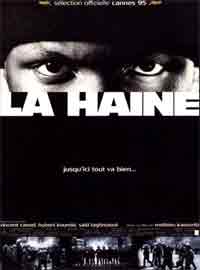 Saturday July 22 - 1:25pm & Sunday July 23 - 5:20pm Saturday July 22 - 1:25pm & Sunday July 23 - 5:20pm
Q & A with Dr Kevin Elstob, professor of French at CSU Sacramento, follows.
In La Haine, Mathieu Kassovitz takes a look at a racially diverse group of young people trapped in harsh and grim housing projects outside of Paris. Vincent Cassel, in his first major role - also starring in
Irréversible, shown at the SFFF Saturday July 22nd at Midnight ) is Jewish, Hubert (Hubert Koundé) is black, and Saïd (Saïd Taghmaoui) the youngest, is Arabic. Marginalized, with no jobs, no parents who care and no prospects, they hang out and wander in the streets where they are routinely hassled by cops. One day a street riot breaks out after the police seriously injure an Arab student. When Vinz, the central figure of the film, finds a gun lost by the police during the riots, the spiral of violence escalates and builds toward a memorable conclusion.
Shot in black and white, in a "cinéma-vérité" style, La Haine follows the three friends during a single day. The characters are no longer teenagers and the film concerns are not sex and drugs but crime, violence and the dead-end future of young men regardless of their racial background. La Haine offers no solution to social problems but accurately describes the frustration and anger of these young men victims of their situation. The film was condemned for its strong anti-police message. It makes a powerful statement that violence begets violence. Mathieu Kassovitz won the Best Director Award for La Haine at the Cannes Film Festival in 1995.
Ten years later, La Haine is more relevant than ever. In the fall of 2005, riots broke out all over France following the death of two young men purchased by the police. The desperation and anger are the same. To quote the film: "Jusqu'ici tout va bien. L'important ce n'est pas la chute, c'est l'atterrissage" ("So far so good . It's not about how you fall. It's about how you land.")
Shown with Raison d'être by Karim Drissi
"Hate" is a visceral fable of a divided society heading blindly for a crash-landing." - Kevin Thomas - The Los Angeles Times
"One of the most blisteringly effective pieces of urban cinema ever made" - Wendy Ide - The Times Of London |
Short Film Program - 1
Various Artists - 2004-2005
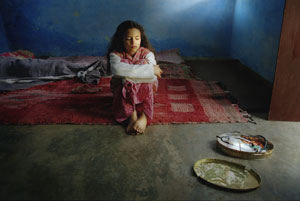 Amal by Ali Benkirane (17 min) - 2004 (in Arabic) Amal by Ali Benkirane (17 min) - 2004 (in Arabic)
Amal is a 12 year old little girl who lives in the Moroccan countryside. Each day she gets up at dawn and walks with ehr brother to the village school, several miles form their farm. She is a serious and dedicated pupil and dreams of becoming a doctor... Till the day her parents decide not to send her to school anymore.
Un Beau Matin (One Fine Morning) by Serge Avédekian (12 min) - 2005 (animation)
A student and a photographer accept, without too many qualms, to give up their pets which no longer correspond to the norms established by the state. But these new norms soon extend beyond cats and dogs...
Dérives (Drifting) by Bill Barluet (20 min) - 2005
Francis is released after forty years in prison full of hope and illusions as he embarks on a new life in his mid-sixties. Lucie, the young lady in charge of his rehabilitation, waits for him at the exit. Offering a sympathetic ear to the disillusioned Francis, she acts as an intermediary to this new alienating environment in which he finds himself.
Patiente 69 (Room 69) by Jean-Patrick Benes & Allan Mauduit (20 min) - 2005
Prix du Jury, Best Actor & Audience Prize, Valenciennes 2006, Audience Prize, Villeurbanne 2006,...
Stephane, a young intern, carries out his first evening of night duty in a psychiatric clinic. "Whatever you do, never go down this corridor" is the only advice the head doctor gives him before leaving him alone for the night - exactly the wrong thing to say to Stephane.
Les Princesses de la piste (Painting the Town Red) by Marie Hélia (37 min) - 2005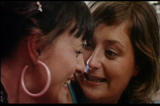
Grand Prix de Bruxelles 2005 -
Grand Prix de "Côté Court" 2005 -
Best Screenplay, Grenoble 2005 -
Prix La Lanterna Magica 2005 -
Audeince Prize Ciné-Essone 2005 -
Best Actress, Vendôme 2005 - Coup de cour du court-métrage short film award, Cannes 2006,...
Just like every other Saturday afternoon, twenty-year-old Katia and Céline, workers in a plant nursery, hang-out in shops and bars. Boredom follows in the wake of their platform shoes. While in the restroom of a bar, Céline reads the many graffiti scrawled on the wall. She notices one: "All women have the right to love 06 99 77 55 01." The two girls decide to call the number.
Marcel ! by Jean Achache (9 min) - 2004
While looking at Marcel Duchamp's ready-mades at the Centre George Pompidou in Paris, Zack and Seb realize that the bottle holder gathering dust in their parents' cellar is a spitting image of a piece by the great artist. They decide try to sell the object to a gallery, learning a lesson about art and stirring up a bit of a ruckus in the process.
Unifrance is an organization dedicated to promoting French cinema worldwide.
Unifrance is involved in every stage in the life of a French film abroad, from its selection at a recognized film festival to its presentation at an international market, to its commercial release in one or more foreign territories.
Visit Unifrance international database |
�
Short Film Program - 2
Various Artists - 2004 - 2005
| 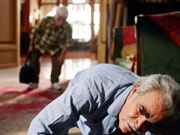 Beyrouth après-rasage (After Shave) by Hani Tamba (27 min) - 2004 (in Lebanese) Beyrouth après-rasage (After Shave) by Hani Tamba (27 min) - 2004 (in Lebanese)
César for Best Short film in 2005 -
Lutin 2006 for Best Fiction Film,...
Abou Milad is an old door-to-door barber who lost his barber shop during the Lebanese civil war and now works in cafés. One day he learns that the rich Monsieur Raymond, who lives a clostered life in his big mansion since the death of his wife, is looking for a barber.
La Bourde (The Faux Pas) by Mathieu Demy (20 min) - 2004
At The Dove House, the chef doesn't take things lightly. The cooking must be creative and refined, the staff elegant and discreet. The arrival of a most unusual client sends everyone spinning.
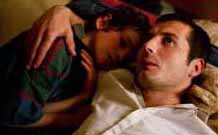 De Retour by Jalil Lespert (23 min) - 2004 De Retour by Jalil Lespert (23 min) - 2004
Franck Sautrez, Best Actor, International Short Film Festival Clermont Ferrand 2005,...
Released from prison, a young man returns to his family and circle of friends. First film by actor Jalil Lespert starring in Le Petit Lieutenant at the 2006 SFFF.
Fais de beaux
rêves (Sweet Dreams) by Marilyne Canto (22 min) - 2005
At night she dreams about it, during the day she believes she's dreaming. But, Élise goes on, acts, and despite her pain, chooses life.
La Petite Flamme (The Tiny Flame) by Elizabeth Marre & Olivier Pont (15 min) - 2005
Bruno is having doubts: about relationships, love, but above all about the little flame that he no longer sees in Agathe's eyes. So he films: strangers, relations, colleagues, friends. Their words share or contradict his thoughts.
Unifrance is an organization dedicated to promoting French cinema worldwide.
Unifrance is involved in every stage in the life of a French film abroad, from its selection at a recognized film festival to its presentation at an international market, to its commercial release in one or more foreign territories. Visit Unifrance international database |
�
Short films prior to feature films
Various Artists - 1962 - 2006
| Local original films
- Sens unique (One-Way Street) by Gilda Taffet (6 min 42) - 2006
A talkative young woman meets a French man at a Sacramento lightrail station.
Shown with Travaux (On sait quand ça commence...) (July 22 - 6:15pm & July 23 - 3:15pm)
- Raison d'être by Karim Drissi (4 min 23)- 2006
It happens every forty minutes in France...
Shown with La Haine (July 22 - 1:25pm & July 23 - 5:20pm)
- The First Try by Raphaël Hitzke (6 min 20) - 2006
A love triangle does not go as expected.
Shown with La Moustache (July 15 - 6:30pm & July 16 - 1pm)
French films - Le Carton (Fair Game) by Didier Guyard (5 min 16) - 2005 (animation) WORLD PREMIERE
Two young sisters set off from Saint Joseph 's Orphanage for a day's outing in the village. They don't have a penny, but their heads are full of ideas on how to spend a sunny Sunday...
Shown with Les Brigades du Tigre (July 14 -8:30pm)
- La Révolution des crabes (The Crab Revolution) by Arthur de Pins (5 min) - 2004 (animation)
Audience Prize, Annecy 2004
The crabs of the Gironde estuary in France, better know as the depressed crabs, face a serious handicap: they can't change direction and are obliged to follow the same straight line their whole lives. How do they cope with this tragic fate?
Shown with Vers le sud (July 23 - 7:40pm)
- Le Baiser (The Kiss) by Stéfan Le Lay (4 min) - 2005
A young woman has a meeting with a young man to exchange their first kiss. Nothing could more ordinary, but "Le Baiser" was shot in 1908 and has never been shown since.
Shown with Les Temps qui changent (July 15 - 1:55pm & July 16 - 5:25pm)
- Ligne verte (Green Line) by Laurent Mareschal (4 min) - 2005
A fresco on a wall unfolds in front of our eyes to the sound of construction work, distant but omnipresent. This painting represents a Mediterranean landscape. The wall is the one separating Israel and Palestine.
Shown with Weekend (July 22- 3:45pm & July 23 - 10:30am)  - Bouts en train by Émilie Sengelin (4 min) - 2005 (animation)
In a train, everyone is lost deep in their own thoughts. The train breaks down, eyes meet and voices break out in song.
Shown with Les Vacances de Monsieur Hulot (July 15 - 4:15pm & July 16 - 10:45am )
- Nocturne by Guillaume Delaunay (4 min 30) - 2005
In the darkness of a forest, nocturnal folk awaken. The full moon comes out from behind a cloud, eyes light up, a scream rips through the night.
Shown with Le Petit Lieutenant (July 22 - 8:30pm & July 23 - 12:50pm )
- A l'Ombre du voile (Shadow of Veil) by Arnaud Demuynk (9 min) - 2006
Two Muslim women, a mother and her daughter, go to a demonstration against the law banning muslim headscarves in schools. Back at home, the mother encourages her daughter to give up her headscarf.
Shown with Gabrielle (July 15 - 8:45pm) - Le Poulet by Claude Berri (16 min) - 1962
Best Short Film Venice Film Festival, 1963 / Academy Awards, Best Live Action Short Subject, 1965
A little boy finds that an egg is the best protection from the Sunday stew pot for his beloved rooster.
Shown with Le Vieil Homme et l'enfant (July 15 - 11:40am & July 16 - 3:10pm)
|
�
|